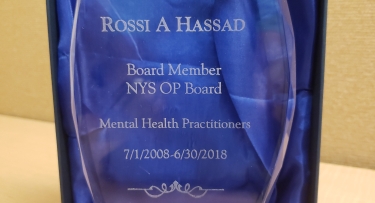Mercy Professor Honored for Completing 10 Years of Service on State Board

Mercy Professor Dr. Rossi Hassad was recently honored for completing 10 years (two successive five-year terms) as a member of the New York State Board for Mental Health Practitioners, which regulates the practice of four professions: mental health counseling, marriage and family therapy, psychoanalysis and creative arts therapy. He was invited to extend his service by participating in peer panels for another five-year term until 2023.
“When I applied to serve on the Board in 2007, these four professions were relatively new in terms of being formalized in law, and I thought that it would be a great opportunity to contribute to professional regulation," Hassad says. "So I was delighted to be selected to serve.”
He asserts that the Board’s work is primarily about protecting the public by ensuring that mental health practitioners are competent. In participating in such important work, Hassad brings to life Mercy’s value of serving others.
The Board oversees professional preparation and conduct, including by advising on licensing requirements and by participating in licensure disciplinary proceedings. Hassad notes that a key accomplishment during his term was the implementation of regulations and guidelines for continuing education requirements in mental health counseling, marriage and family therapy, psychoanalysis and creative arts therapy. These new regulations and guidelines help to ensure that practitioners are competent, meaning that they follow the current best practices in the field, including evidence-based strategies.
Hassad is a licensed mental health practitioner, statistics educator and epidemiologist. His teaching and scholarship focus primarily on evidence-based practice and statistical literacy in the health and behavioral sciences. Among other courses, he teaches research methods to students in Mercy’s graduate program in mental health counseling. Applying his work on the Board to his teaching, he incorporates information on professional standards and expectations into his curriculum, especially with reference to evidence-based practice.
“It was a distinct honor and privilege and quite humbling to be selected from amongst my peers to advise and assist the state in the regulation of these four mental health professions toward protecting the public,” he says. “This is a huge responsibility and one that the State takes very seriously. It helped me to better understand the various facets of these professions and their impact on the public. It is reassuring to know that there is a formal system in place to ensure that the public receives services from competent professionals.”
The Regents of the University of the State of New York have approved his appointment to continue to serve on peer panels as an extended Board member for a five-year term through 2023. Peer panelists participate in disciplinary reviews and hearings regarding professional misconduct, licensure restoration, and the moral character fitness of applicants for licensure.
